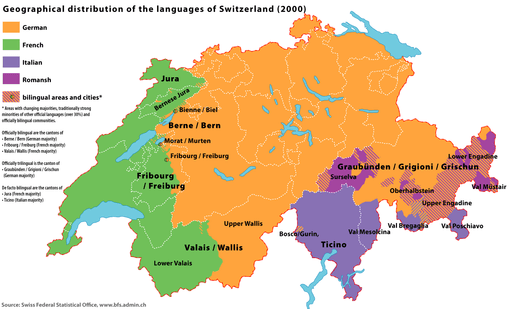Swiss German vs German Language
This article discusses the differences between Swiss German and German language, providing comprehensive information. Switzerland is a European country known for its scenic beauty and is a landlocked country surrounded by other countries. These borders include Italy to the south, France to the west, Germany to the north, and Austria and Liechtenstein to the east. Due to these neighboring countries, the official languages spoken in Switzerland are German, French, Italian, and Romansh. Swiss German is the language spoken in Switzerland with the Alemannic dialect.
What is Swiss German Language?
The Swiss German language is also spoken by a number of people in the Alpine community in northern parts of Italy. Alemannic dialects are sometimes mixed with Swiss German. Mostly, the dialects of Liechtenstein and the Vorarlberg of Austria are mixed with the Swiss German language. There is no unification in the Swiss German language, which is often distributed into Low, High, and Highest Swiss German. There is a wide variety of these languages spoken in areas outside Switzerland as well as inside. The dialect of Swiss German forms a group, the reason being the use of spoken language is unrestricted in different situations of everyday life. The use of the Alemannic dialect of Swiss German in a number of other countries is restricted, and there are countries where the usage of this language and dialect is in danger. Swiss Standard German and Swiss German are two different dialects used in different portions of Switzerland.
What is German Language?
The German language is a language of the Western parts of Germany, closely associated with the Dutch language as well as the English language. German is spoken by almost a hundred million native speakers across the country. German is classified as one of the major languages spoken in the world and is the most widely used language in the European Union as a first language.
What is the difference between Swiss German and German Language?
• Swiss German has no genitive case; however, there are several dialects that have a possessive genitive. In place of genitive cases, there are two constructions: possession and possessor.
• Second, is the usage of dative of possessor with a possessive pronoun that refers to the possessor and the possession.
• On the other hand, the German language has one of the four cases which are nominative, dative, accusative, and genitive, unlike Swiss German.
• The order of verb placement in a specific group is variable in each group, compared to the German language where these verb groups are repeated in the same order.
• All of the related clauses used in Swiss German do not use relative pronouns ever, unlike the German language. Relative pronouns of the German language are replaced by the relative particle of Swiss German.
• Also, the German language uses any of the three genders (neuter, masculine, or feminine), however, this use is not found in Swiss German.
• Endings of words in the German language help identify the gender of the object, unlike the Swiss German language.
• German Language and Swiss German language also differ on the basis of usage of numbers for description. The German language makes more use of numbers compared to Swiss German language, and the usage of singular and plural is found easily in the German language, whereas there is no relation of singular or plural in Swiss German.
• The vocabulary of Swiss German and German is also different. Swiss German obtains most of the vocabulary that has been retained and the vocabulary is rich with numerous words. There are a few words which have been obtained from Greek and Latin, as well as French in some cases. There have been a few words from English that are included in German.
Key Takeaways
- Swiss German is spoken in Switzerland and uses the Alemannic dialect, while German is spoken in western Germany and is closely associated with the Dutch and English languages.
- Swiss German has no genitive case and does not use relative pronouns, while German has four cases (nominative, dative, accusative, and genitive) and uses relative pronouns.
- Swiss German and German have different vocabularies, with Swiss German retaining most of its original vocabulary and obtaining some words from Greek, Latin, and French, while German includes a few words from English.
